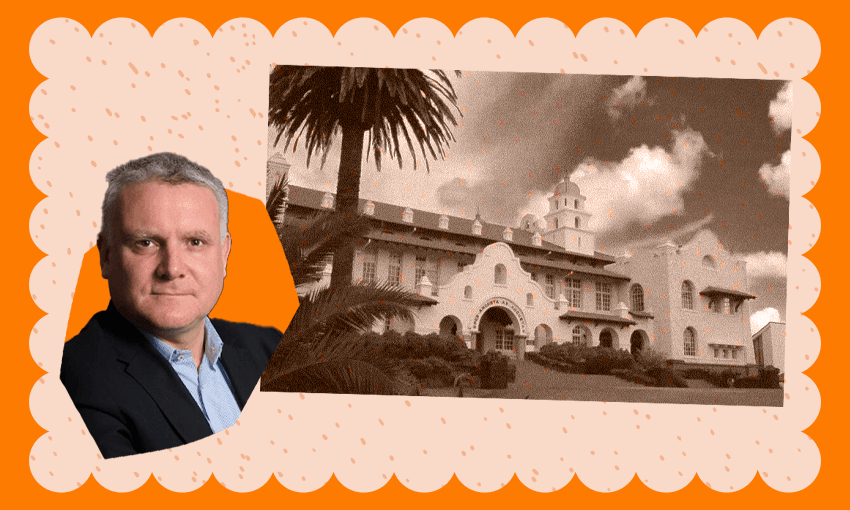The rightwing political commentator gave a speech to his former school which was much admired by the left – until Auckland councillor Richard Hills signalled his support.
Speeches at Auckland Grammar are typically fairly worthy but dull affairs. I know because I sat through them for five years, and can remember no more than a couple with any clarity. I can say with a high degree of confidence that the speech political commentator and lobbyist Matthew Hooton gave on Friday will be among the more memorable ever delivered in the Great Hall, the school’s cavernous century-old assembly room, all wood panelling and gold leaf paint and the cultivated weight of all who have gone before.
Hooton’s speech began much the same as any other, adroitly updating a quote from Socrates – though it did nod at where he would take it, in the message that young people have always been unfairly critiqued by their elders. From there it quickly leapt into places which are unlikely to ever have been admitted to from that stage.
“Our group, in the second half of the 1980s here at Auckland Grammar, were generally good people. But, compared with you, we were racist. We were sexist. We were homophobic. We were not transphobic, but only because it wouldn’t have occurred to us that some of our schoolmates were unsure about gender. We didn’t think twice about driving drunk. Nearly 100 per cent of us would have committed what, by today’s standards, would be considered a sexual assault. We knew no means no. But we didn’t know that yes actually requires a yes.”
To acknowledge all this in many high schools in New Zealand would be somewhere between a given and a provocation. To do it at Auckland Grammar – a place which has existed to, among other things, instil a deep sense of exceptionalism in its student body – could be considered the rhetorical equivalent of tagging the honours boards.
He did not stop there. Grammar boys are told from day one that they are the best and brightest of their generation. Hooton would have none of that. “By virtue of being at this school, you are all part of the top 1% of this country, in terms of the support and the opportunities available to you,” he said, which the school ideologically accepts. Then he followed it with “you’re not better people because you go to Auckland Grammar. You’re just luckier,” which is true, but at a school with such an intense belief in meritocracy, that still ranks its classes by academic grading from A through R (with A in the front row and R at the rear), it’s a very challenging statement.
He goes on to call the current student body woke snowflakes, admiringly, and to laud their focus on mental health and wellbeing. Before long he is confessing to his own recent ADHD diagnosis, and talking openly about his alcoholism, which “threatened my marriage, my relationships with my children and my friendships, even with my Grammar mates”.
The message and the messenger
Taken in isolation, it’s a pretty fascinating and progressive speech – indicative of a cultural evolution at the school, and made more interesting again by the man delivering it. Hooton is a complex character, and as his biographical interventions make clear, he is far from the central casting Grammar boy. He has achieved national fame due to his incisive political commentary, with a long and varied CV which includes speechwriting for ministers, consulting for enormous firms, and a certain ubiquity on various print and broadcast channels. But he was at best an indifferent student, and his life, while prominent and public, has been studded with controversy.
He has emerged as New Zealand’s most consistently interesting rightwing thinker, part of National’s liberal wing, given to brilliantly original and considered perspectives and highly principled positions, such as his relentless pursuit of the Saudi sheep scandal. Throughout he has been as capable of base trolling, particularly on Twitter, to which he admitted to being addicted and described as having the “same characteristics as a slot machine, in that it gives you an immediate response,” in a 2018 interview with Toby Manhire.
Yet he has not confined himself to simply airing opinions. On multiple occasions, like a moth to the flame, he has been drawn into the National party’s internal affairs, with sometimes inglorious results. He was revealed as playing a key role in the coup which ousted Simon Bridges as leader of the National party in 2020, installing his friend Todd Muller for a disastrous two month period which precipitated a lengthy stretch of chaos under Judith Collins. That ended with the installation of Christopher Luxon as leader, but Hooton has not embraced the new leader, instead proving his most reliable and pointed critic, of any stripe.
Most notoriously, he was a character in two of Nicky Hager’s most famous books, The Hollow Men and Dirty Politics. Both are based on leaked emails, which remains infuriating as source material to Hooton, but that’s hardly an excuse for his apparent doxing of Hager’s address, with at best an indifference to whether that might lead to harm coming to the author.
These are the two sides of Hooton: the cerebral philosopher, the critic and conscience of the National party; and the venal political operative who delights in causing chaos with his tweets. Any holistic appraisal of him would have to wrestle with each. Which is what made the response to his sharing of his speech so startling.
Hooton runs a Patreon, in which he shares his thoughts on “politics, sport, economics, philosophy” and more. He posted his speech to Grammar there on Friday and, in response to multiple requests, unlocked it from behind the paywall. Not long after, it became a Rorschach test, a window into how he is perceived by two different audiences.
One speech, two reactions
A large proportion of Hooton’s followers loved the speech. Some were those who you might predict would applaud an address by a noteworthy old boy to the most establishment state school in the country – into that bucket fall Herald columnist Fran O’Sullivan and right-leaning pollster David Farrar – but what was most instructive was how many people from the left found something to love in its themes. It’s hardly surprising – any basic analysis would suggest the pre-eminent right wing mind of his generation was conceding that the left had been correct in a lot of its posture over the past few years. Hence former Labour campaign manager Shane Te Pou, ex-Green MP Nandor Tanzcos, ex-Auckland Pride director Max Tweedie, and current Labour MPs Deborah Russell and Anna Lorck all being among those who admired the speech.
One more was Richard Hills. The Auckland Councillor shared it with his followers along with a fairly anodyne comment: “I’ve got to know @MatthewHootonNz over the past few months. He was very nice to me and has a great sense of humour. A good speech and one I would think would have a positive impact on many of the young men he was speaking to.”
A left-leaning Councillor expressing admiration for an erstwhile political opponent, due to a speech which seemed designed to be read as reflective and conciliatory, at a time when the country was still picking itself up from a crushing storm amidst the associated bout of unity which often follows such events. The speech seemed to ask for that kind of magnanimous response – “an interesting ride”, Hooton euphemistically calls his alcoholic and pre-ADHD diagnosis life. It also could be read as asking for a wider application of the possibility of redemption in its admiration for the “person who can make amends”.
The response to Hills’ tweet was so vitriolic that he appears to have locked his account in response (he has not responded to a request for comment by The Spinoff’s deadline). “Good bloke-ism”, “The whole speech was smug”, “absolutely abhorrent”, “a state school should not be offering a free speaking spot to a person like Hooton” typified the responses to Hills’ tweet. It escalated from there, and by the day’s end, “Matthew Hooton” was no longer trending – but “Richard Hills” was.
On some level this was predictable, and the fury at Hooton understandable. It happened in a venue which had seen him at his most extreme, where those who loathe him understand him as inherently evil and dangerous. Some remain angry at Hooton’s association with mayor Wayne Brown, who has not made many friends since his election, particularly after the floods. But the speech read to many from across the political spectrum as admirable, even radical, given its venue and audience. While some would glance at Hooton’s record and refuse to ever take him at face value, he says in a note accompanying the speech “I meant every word”. A section of Twitter’s audience are within their rights to view him as hopelessly compromised; clearly hundreds of people from across politics believed him.
Richard Hills among them. For this sin he has been pilloried and, after weeks spent helping flood victims, been forced to wall off a platform which has been key to his social media engagement at a time of regional and national crisis. The gap between the sentiments of the speech itself and the furious response to one small gesture of support across the aisle seems to prove one of Hooton’s most stinging lines: that when being woke comes to “mean being haughty about your virtues, then that does become a vice.”





